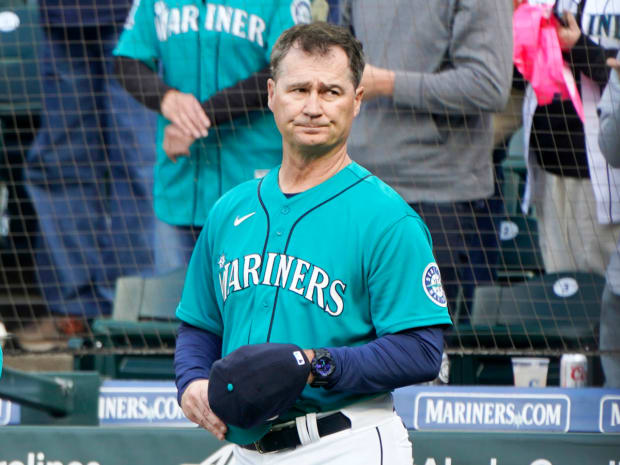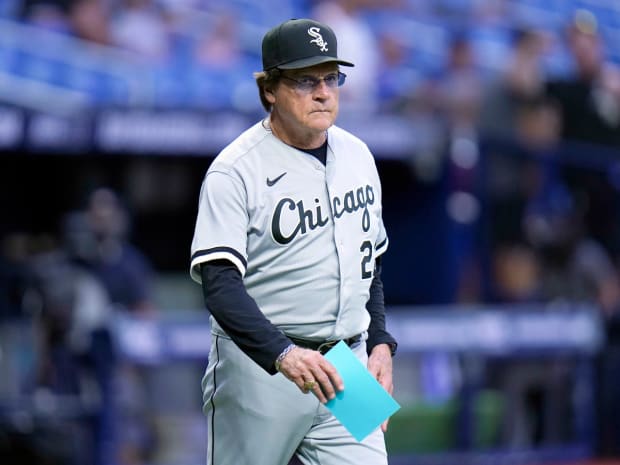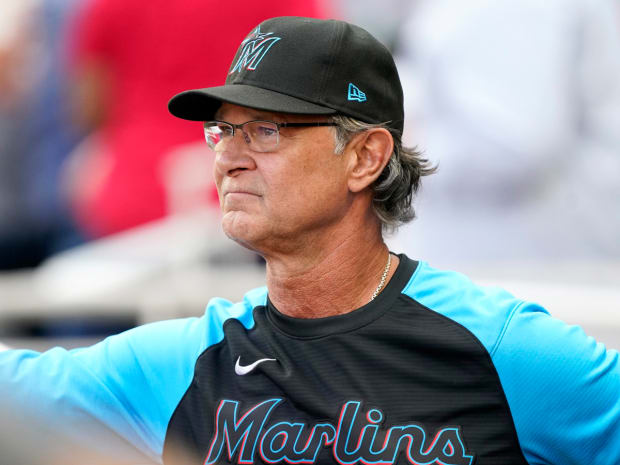Welcome to The Opener, where every weekday morning during the regular season you’ll get a fresh, topical story to start your day from one of SI.com’s MLB writers.
Until last Friday, MLB had gone nearly four years without a managerial firing during the middle of a full 162-game season, since the Cardinals dismissed Mike Matheny in July 2018. That’s a remarkable change in pace from earlier this century, when an average of 3.5 teams each year changed managers midseason between ’01 and ’11.
In a time before decisions were heavily influenced by data provided by the front office, switching up the manager was a common tactic for a team looking for a spark or change in philosophy. In 2001 the Red Sox, having lost six of seven, fired Jimy Williams in mid-August despite being just 2½ games out of a playoff spot. In ’02, three managers were fired by May 1. In ‘03, the Marlins fired Jeff Torborg in May, replaced him with Jack McKeon and went on to win the World Series. In ‘04, Williams was fired midseason again—this time by the Astros, who hired Phil Garner, who’d been fired in April ’02 by the Tigers. You get the point.
That sort of thing doesn’t happen too often anymore because so many field managers are more or less carrying out what their general manager envisions, so there’s not much benefit to rocking the boat in the middle of the voyage.
Over the last week, however, two World Series–winning managers were given their marching orders; the Phillies fired Joe Girardi on Friday, and the Angels dismissed Joe Maddon on Tuesday. And with the way some teams have been underperforming, they may not be the last to receive a pink slip before the season is out. Here are the six managers who could be in danger, from least likely to most likely, of losing his job over the next few months.

AP Photo/Ted S. Warren
Scott Servais, Mariners
The Mariners are actually on pace to finish with a better run differential than they did a year ago, when they won 90 games, despite a -51 run differential (the worst such figure for any 90-win team in MLB history), and were in the playoff race until the last game of the season. But their cluster luck has seemingly run out, and their postseason odds have nearly been halved since Opening Day, from 22.8% to 11.6%, according to FanGraphs.
If you talk to the Mariners fans you know, they’ve probably reverted to their generally pessimistic outlook. The reigning AL Cy Young Award winner Robbie Ray, whom they signed for five years and $115 million in November, has looked worryingly hittable, Jarred Kelenic is back down in Triple A after another discouraging big-league stint, and the bullpen has regressed badly after the unit was a key part of last season’s success.
Despite all that, Servais probably won’t get fired. He and president of baseball operations Jerry Dipoto have a good working relationship going back to their time with the Angels. Also, Servais signed an extension Sept. 1, 2021 (the length of which is unknown, but runs through at least ’23), and the Mariners have quietly won their last three series. But that security could change if the M’s continue to mire in fourth place in the AL West. After a rubber match against the Astros on Wednesday, Seattle has a huge home stand against a trio of fellow contenders in the Red Sox, Twins and Angels—the last of which is a massive five-game set that could prove decisive for each of the division rivals.
David Bell, Reds
Twenty years ago, Bell’s father, Buddy Bell, was fired by the Rockies in April 2002 after Colorado won just six of its first 22 games, which then was the worst start in franchise history. The Reds endured an even more miserable stretch at the beginning of this season, starting 3–22, and Bell avoided his father’s fate as an April casualty, so they probably would have fired him already if they were going to do so midseason. They had no such hesitation with Bell’s predecessor in Cincinnati, Bryan Price, who was fired in April ’19 after a 3–15 start. And let’s not forget how Cincinnati overachieved last year following its first, less extreme series of cost-cutting moves during the ’20–21 offseason.
Unfortunately, Bell’s fate is probably already sealed despite signing an extension through 2023 at the end of last season. Teams don’t usually like to head into a season with a manager on an expiring contract, and it’s hard to see Bell earning another extension with the way the Reds have played—even though it’s not his fault that Cincinnati cut payroll to a point where it’d be nearly impossible to contend as constructed. Bell may not be cut loose midseason, but I’d bet he’s one of the first managers out of a job this offseason.

AP Photo/Chris O’Meara
Tony La Russa, White Sox
The White Sox are only four games back in the AL Central and one game out of a wild-card spot after taking two of three from the Rays and beating the Dodgers on Tuesday, but they have a losing record of 26–27 after they were widely expected to run away with the division. They also have a -52 run differential that indicates they’ve been playing even worse than their already disappointing record indicates. Chicago has endured a spat of injuries as key contributors such as Lance Lynn, Luis Robert, Eloy Jiménez, Yoán Moncada, Tim Anderson, AJ Pollock, Joe Kelly and Garrett Crochet have missed varying amounts of time, but bad luck alone can’t explain the South Siders’ struggles. They’ve allowed the most runs of any AL team not in last place.
We know that the White Sox and La Russa agreed to a “multiyear” contract when he stunned the baseball world by coming out of retirement before the 2021 season, but we don’t know its specific length. If the 77-year-old is only guaranteed a deal until the end of this season and the Sox continue to succumb to their injuries (and bottom-five offense), there won’t be much reason to keep around La Russa, who’s had more than his fair share of public missteps since returning to the dugout.
Davey Martinez, Nationals
It was always a bit odd that Martinez and Washington didn’t come to an agreement on a contract extension after he guided them to the first World Series title in franchise history. That instead came near the end of the 2020 campaign, which ended with the Nationals tied for last in the NL East. They finished all alone in last place in 2021, and are back there again now. The Cubs ended up moving on from Maddon three seasons after he helped end the franchise’s World Series drought. It seems the Nats are on track to operate on the same timeline.
Now the longest-tenured manager in Nationals history (not including the franchise’s time in Montreal), Martinez has an option for the 2023 season that must be exercised by next month’s All-Star Game (as does GM Mike Rizzo). With Washington sporting MLB’s fourth-worst record and second-worst run differential, that seems rather unlikely. Perhaps the organization instead rips off the Band-Aid at some point this summer, though Rizzo went on 106.7 The Fan Wednesday morning and said that Martinez “is the guy to take this team to the next level when we’re prepared to do so—and I think we’re prepared to do so in the near future.” Given the dire state of both the Nationals’ farm system and big-league club, I’m not convinced.
I think the Nationals will grant Martinez the grace of an offseason exit given his place in the club’s history. But Washington’s front office was probably not expecting to finish in the cellar for three consecutive seasons after winning a championship, and it looks like that’s exactly what’s going to happen.

AP Photo/John Bazemore
Don Mattingly, Marlins
Mattingly was named the NL’s Manager of the Year after helping snap Miami’s 17-season playoff drought in extraordinary fashion, navigating the Marlins through a COVID-19 outbreak that contributed to 174 roster moves in a 60-game slate. But Miami has struggled to take the next step that many within the organization expected after that abrupt rise to prominence.
Though is the winningest and longest-tenured skipper in Marlins history by nearly two and a half seasons, Mattingly has been with the organization since 2016—two seasons before the ownership group previously associated with Derek Jeter took charge. He also long predates GM Kim Ng’s involvement with the team. In baseball, GMs generally want to work with their “guy,” and Mattingly is not really anyone’s “guy” in Miami anymore. Plus, his contract is up at the end of the season.
The Marlins (23–30) are currently 5.5 games out of a playoff spot despite owning a +17 differential and an expected record of 28–25. It’s certainly not too late for them to turn things around. But if the Fish continue to flounder (pun very much intended), it wouldn’t surprise me to see Mattingly get the boot in an old-fashioned attempt to spark a late-season run. The other option, if Miami doesn’t want him around long term, is to let his contract expire after the season.
Mike Matheny, Royals
Kansas City’s front office placed optimistic expectations on this team heading into the season, and you can sort of understand why. The Royals had increased their win percentage in each of the last three seasons, and they had a winning record after the 2021 All-Star break. They boasted a talent-rich if young rotation, had several bounce-back candidates on offense and possessed stellar speed and defense. The Royals were confident enough to let top prospect Bobby Witt Jr. make the Opening Day roster, and although it’s a good thing for baseball that they didn’t manipulate his service time, they robbed themselves of the chance to delay his debut enough to deny him Super Two status and prolong his eventual foray into free agency. There was an expectation of playoff contention, if not qualification, with the expanded 12-team field.
Fast forward two months, and the Royals have the worst record (17–37) and run differential (-96) in the majors. They have a bottom-three offense by OPS and the AL’s highest ERA (5.19) by a full run. It’s been ugly.
Matheny already knows what it’s like to be let go in the middle of the summer after St. Louis sacked him a few years ago, so he may already have a few vacation spots in mind in case Kansas City cans him.







